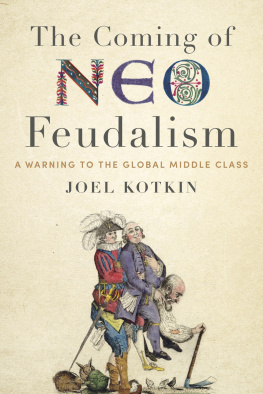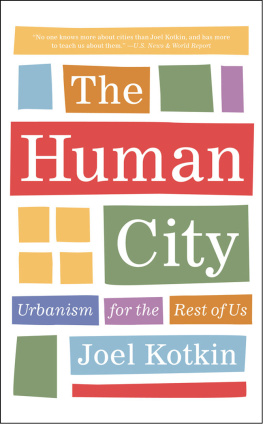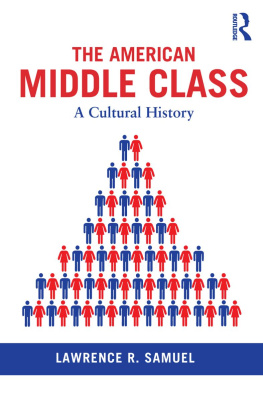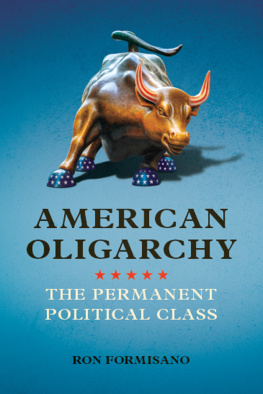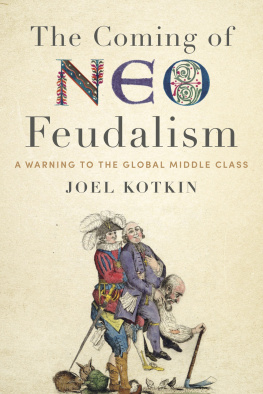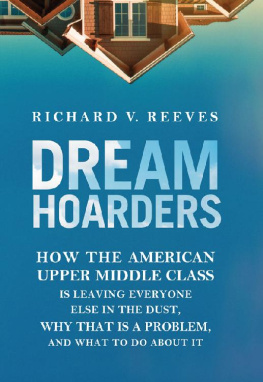
Also by Joel Kotkin
California Inc. (with Paul Grabowicz)
The Valley
The Third Century: Americas Resurgence
in the Asian Era (with Yoriko Kishimoto)
Tribes: How Race, Religion, and Identity
Determine Success in the New Global Economy
The New Geography: How the Digital Revolution
Is Reshaping the American Landscape
The City: A Global History
The Next Hundred Million: America in 2050
Copyright 2014 Telos Press Publishing
All rights reserved. No portion of this book may be reproduced or transmitted in any form by any means, electronic, mechanical, photocopying, recording, or otherwise, without permission in writing from the publisher. For information on getting permission for reprints or excerpts, contact telos@telospress.com.
Printed in the United States of America
ISBN: 978-0-914386-31-5 (eBook)
The Library of Congress has catalogued the hardcover edition as follows:
Kotkin, Joel.
The new class conflict / Joel Kotkin ; with a Foreword by Fred Siegel.
pages cm
Includes bibliographical references.
ISBN 978-0-914386-28-5 (alk. paper)
1. Social conflictUnited States. 2. Elite (Social sciences)United States. 3. High technology industriesUnited States. 4. Middle classUnited States. I. Title.
HM1121.K68 2014
303.60973dc23
2014023194
Telos Press Publishing
PO Box 811
Candor, NY 13743
www.telospress.com
To Mandy, my partner in life and greatest source of advice and inspiration. More than anything, her love keeps me going.
Contents
FOREWORD
Fixing the Broken Compass
From roughly 1916 to 1932 the journalist-intellectual H. L. Mencken set the tone for much of American reporting by way of his thumb-sucking pieces on the American scene, collected in six volumes of his Prejudices . Most of the pieces were written from Menckens hometown of Baltimore, and on the unusual occasion when he traveled to observe the scene, as in his coverage of the famous Scopes trial, what he wrote was more a reflection of his prejudices than the events observed. Joel Kotkin is the anti-Mencken; for the past quarter century his richly grounded writings have been essential reading for anyone trying to make sense of American society and politics. Kotkin has toured the globe, and, more importantly for this volume, he has traveled across America to report on developments overlooked or more often misunderstood by the press. But where Mencken overwrote so that his prose often became the story, Kotkin writes in a fluid, transparent style in which the scene he is describing comes to life o n the page unobscured by rhetorical pyrotechni cs.
Time and again, Kotkin, informed not only by on-the-ground observation but also by a firm grounding in the nations demographic changes, has challenged conventional accounts of American society. For example while a flood of articles from the New York Times and major magazines such as the Atlantic , the New Republic , and Harpers evoked the supposed decline of suburbia and the repopulation of Americas downtowns over the past two decades, Kotkin has deflated these self-serving pretensions. The numbers he has patiently explained, time and again, do not demonstrate such a transformation. The stories being written reflect, he shows, the lifestyles and sense of self-importance of the people writing such articles and the interests of their friends and allies in hip architectural claques. A former New Yorker who has lived in Los Angeles for the past forty years, he has described both the citys ascent in the 1980s and 1990s and its decline over the past twenty years. His personal attachments to his adopted home notwithstanding, the evidence and not emotion has imposed itself on the argument.
In The New Class Conflict Kotkin picks up on a variety of themes he was the first to explore, from the hyping of the so-called creative class, to the oligarchy that tarnishes the shine of Silicon Valley, to the growth of gentry liberalism, which he then weaves together to make it clear that our contemporary political compass is broken. The standard assumptions that fill our quality dailies and their aural offshoots are guided by presuppositions about what constitutes left and right that have been eclipsed by the changes of the past quarter century. To be guided by their compass is to wander aimlessly in a welter of rhetorical posturing in which billionaires who have made their fortunes in coal become the leaders of the left-wing campaign against the Keystone pipeline.
Kotkin guides the attentive reader down the byways of an unprecedented political structure in which the competing elites of the Obama era have attached themselves to dramatically different segments of society. In the new compass the true north of powerful elites points to both a new ruling class defined by the production of abstractions, digital and financial, and another rooted in the manufacture and manipulation of material objects. Similarly, when the arrow points east or west toward the middle class, it designates two dramatically different populations: one rooted in the public, the other in the private sector.
As the country shambles into the post-Obama era, Kotkins writing serves as an essential guide to a new political landscape, one that no longer makes sense in conventional terms.
Fred Siegel
Scholar in Residence
Saint Francis College
Brooklyn, New York
Acknowledgments
More than most books, this one has had a difficult birth. It started as an idea that developed over the past decade, and which I expressed in numerous articles in such places as Forbes , Newsweek , the Wall Street Journal , The Daily Beast , and the Orange County Register , among others. As the ideas in the book did not fit neatly into either right or left perspectives, it proved a more difficult sale than usual.
I owe a great deal of thanks to Fred Siegel, who was originally my coauthor but who remained a strong advisor throughout the process. He also arranged for Telos Press Publishing and Mary Piccone to take on the book. I want to thank Mary, Robert Richardson, Tim Luke, and others at Telos for their advice and support in this process.
The book benefited from strong advice from a remarkable group of colleagues, including attorney David Friedman, a noted expert on land use and PhD in political science at MIT, author Aaron Renn, publisher of the Urbanophile blog, and demographer Wendell Cox. My brother Mark Kotkin, former head of survey research at Consumer Reports , provided much incisive and dispassionate analysis. Tim Luke at Telos was particularly helpful in sketching out the historical background.
I am also in debt to my many editors from the magazine world, who helped hone this message. I would like to thank, in particular, Jeremy Bogaisky, Tunku Varadajan, and Dan Bigman at Forbes ; Mike Tipping, Brian Calle, and Rory Cohen from the Orange County Register ; Brian Anderson at City Journal ; and The Daily Beast s Malcolm Jones, Harry Siegel, and Jake Siegel.
In terms of putting the book together, I want to thank Gary Girod, a graduate of Chapman University, without whose first-class research this effort would have been impossible. I also owe a debt to my assistant, Barbara Moroncini, who kept the files in order and did some significant research work on her own. My wife, Mandy, contributed many hours to copyediting the book, but this is hardly the extent of her contribution. Without her support and encouragement, The New Class Conflict would never have been finished.
I also want to express my appreciation to my mother, Loretta Kotkin, and mother-in-law, Charlotte Shamis. Both grew up in very hard circumstances, one in Brownsville, Brooklyn, and the other in Paris and later Montreal, ultimately finding her American dream in my adopted hometown of Los Angeles. Their personal storiesbuilt on hard work, perseverance, and a sense of fair playare the core values expressed in this book.


